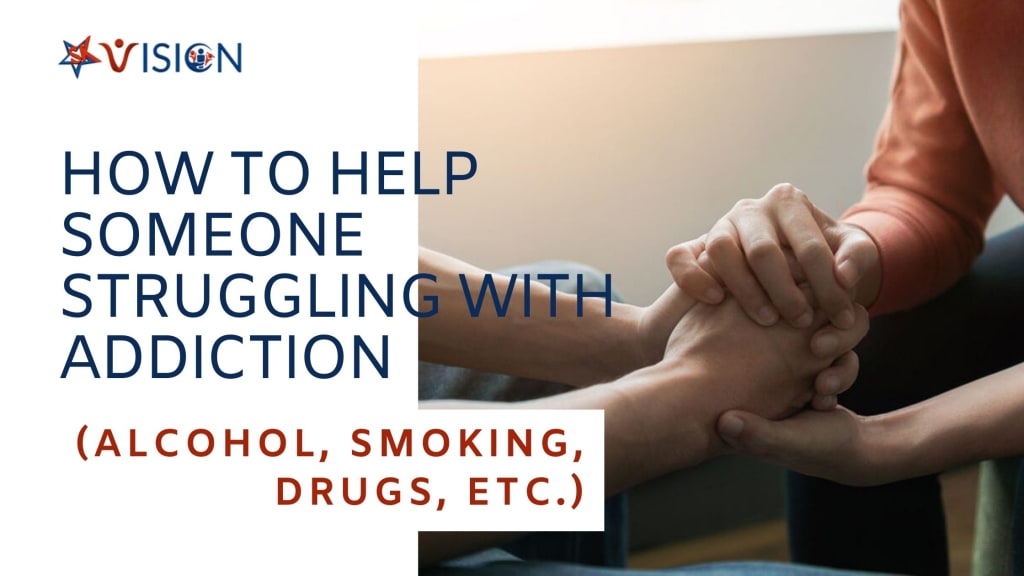How to Help Someone Struggling with Addiction
Like Alcohol, Smoking, Drugs, etc

Helping someone you care about who is struggling with addiction can be incredibly challenging and emotionally draining.
Addiction can take many forms, including alcohol, smoking, and drugs, but the approach to supporting your loved one often involves similar principles.
Here are some steps you can take to help someone on their journey to recovery.
1. Educate Yourself About Addiction
Understanding addiction is the first step in helping someone. Addiction is a complex disease that affects the brain and behavior.
It’s important to recognize that it’s not just about willpower or morality.
Learning about the nature of addiction, its causes, and its impact on the brain can help you empathize with what your loved one is going through.
2. Communicate with Compassion
When you decide to talk to your loved one about their addiction, do so with compassion and without judgment.
Use “I” statements to express your concerns and feelings. For example, “I’m worried about your health and well-being” instead of “You have a problem.”
Avoid blaming, shaming, or criticizing as these can make the person defensive and less likely to listen.
3. Encourage Professional Help
Encourage your loved one to seek professional help.
This could be in the form of a therapist, counselor, or a rehabilitation program.
Offer to help them research options and, if they are willing, accompany them to appointments.
Professional support can provide the necessary tools and strategies for managing addiction.
4. Support Without Enabling
It’s crucial to find a balance between supporting your loved one and enabling their addiction.
Enabling behaviors, such as giving them money or covering up their mistakes, can perpetuate the addiction.
Instead, focus on providing emotional support and encouraging positive behaviors that contribute to their recovery.
5. Create a Supportive Environment
Creating a supportive environment can significantly impact the recovery process.
This might involve removing substances from the home, encouraging healthy activities, and fostering a positive and stress-free atmosphere.
Support groups, like Alcoholics Anonymous (AA) or Narcotics Anonymous (NA), can also offer a sense of community and understanding.
6. Take Care of Yourself
Supporting someone with an addiction can be emotionally taxing.
It’s important to take care of your own mental and physical health.
Seek support from friends, family, or a therapist.
Joining a support group for families of addicts can also provide comfort and advice from others in similar situations.
7. Be Patient and Persistent
Recovery from addiction is often a long and challenging process that includes setbacks.
Be patient and persistent in your support.
Celebrate small victories and remain hopeful, even when progress seems slow.
Your consistent support can make a significant difference in your loved one’s journey to recovery.
8. Avoid Ultimatums Unless Absolutely Necessary
Ultimatums can sometimes push a person further into their addiction rather than encouraging them to seek help.
Use them only as a last resort when the person’s behavior is putting themselves or others in immediate danger.
Even then, frame it in a way that shows you care about their well-being.
9. Educate Them About Healthy Coping Mechanisms
Often, addiction stems from the need to cope with stress, trauma, or other psychological issues.
Encourage your loved one to explore healthy coping mechanisms such as exercise, meditation, hobbies, or spending time with supportive friends and family.
Helping them find alternative ways to deal with their emotions can reduce their reliance on substances.
10. Stay Involved
Long-term support is crucial for someone recovering from addiction. Stay involved in their life and show continuous support.
Regular check-ins and participating in their recovery journey can help them feel less isolated and more motivated to stay on track.
Join SK Vision For a Better & Bright Future
Conclusion
Helping someone struggling with addiction is not easy, but your support can be a powerful force in their recovery journey.
Educate yourself, communicate with compassion, encourage professional help, and provide a supportive environment.
Remember to take care of yourself and be patient. Your efforts can make a profound difference in your loved one’s life.
About the Creator
Enjoyed the story? Support the Creator.
Subscribe for free to receive all their stories in your feed. You could also pledge your support or give them a one-off tip, letting them know you appreciate their work.






Comments
There are no comments for this story
Be the first to respond and start the conversation.